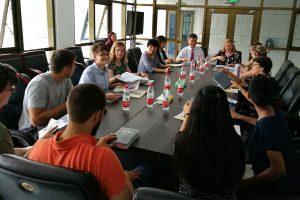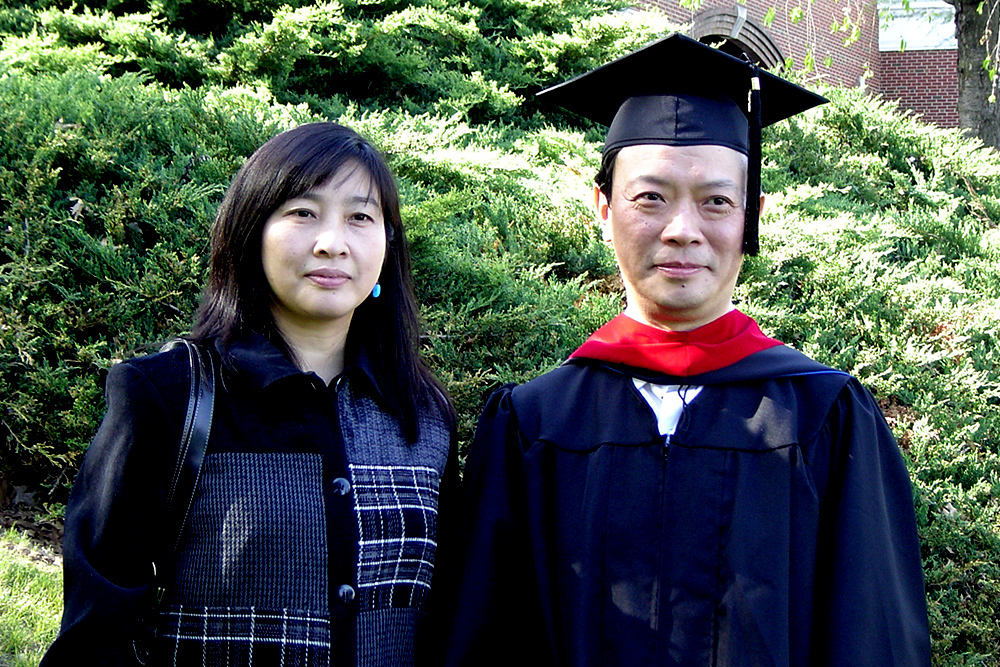EMU’s alumni award winners will be honored during the Oct. 11-13 Homecoming and Family Weekend. Read more about Young Alum Liza Heavener and Alum of the Year Erik Kratz.
Wu Wei MDiv ’06, president of the largest organization of Christian churches and believers in China, is Eastern Mennonite University’s Distinguished Service Award honoree for 2019.
He was named to the presidency of the China Christian Council in November 2018.
The CCC provides theological training through a network of seminaries and Bible schools and provides Bibles and materials for churches. The organization also oversees pastoral development and has formulated an ecclesiological order for local churches. As the voice of the registered Chinese churches to church bodies overseas and a member of the World Council of Churches, the CCC connects to provincial and municipal church councils across China and hosts numerous delegations from churches all over the world.
In a June 2019 address to the World Council of Churches Faith and Order Commission, Wu offered the following information about the work of his organization:
... there are over 38 million Protestants with an increase of 400,000 every year. There are about 60,000 congregations, 14,000 ordained clergies (including pastors, associate pastors, elders), 22,000 full-time preachers, 200,000 lay leaders.
In order to satisfy needs of Christians, China Christian Council has published 84 million copies of the Bible. In addition to the Mandarin Bible, the Bible has also been translated into another 13 ethnic minority languages. The media department of CCC&TSPM has as well published a great number of books and journals through various channels. In order to reach more young adults, attempts have been taken to make avail of Internet and social networks.
With the intention to train more qualified ministers, we have set up 22 seminaries across China with a total number of over 3,700 enrolled students. In the past five years, 6,300 students graduated from those seminaries. Besides, local churches have set up training centers and classes of different types.

A native of Beijing, Wu grew up in a Christian home and graduated from the national seminary in Nanjing. As senior pastor of the largest church in Beijing, he met teachers serving with Mennonite Partners in China who encouraged him to pursue his dream of studying overseas.
Supported by Mennonite Partners in China and the seminary, Wu studied in Harrisonburg, Virginia for four years. He and his wife, Wu Jinzhen, then spent five years pastoring a small Chinese-language congregation in Louisville, Kentucky.
Back in China in 2011, Wu asked to return to the pastorate, but church leaders and the Beijing government asked him to serve in an administrative capacity, overseeing churches and pastors in the city. During these years in Beijing, Wu often talked about the challenge of working with government policies and officials while promoting the mission of the church.
During his time at EMS, Wu attended a number of church events, including several Mennonite Church USA Assemblies. He did an internship at the Parkview Mennonite Church in Harrisonburg. In a church presentation, Wu spoke about how “the political environment and social context may often change, but God’s grace and Jesus’ commission for the church will never change.”
He also stressed that Christians serve as a small minority in China and the importance of believers “needing to strengthen Christian witness to society by uniting all Christians so that others can know Christ.”
While Wu supports the post-denominational status of the Chinese church, he often refers to the ways in which his seminary professors and his reading of Anabaptist writers helped shape his theology. “The social ethic of Jesus was not to withdraw from society or the world, but to assume a life style that could be kept with integrity,” he said.
When asked what Christians outside of China can do to assist the church, Wu always answers, “You need to pray for us.”
Portions of this article appeared in a Feb. 5, 2019, EMU news article about his new role.
